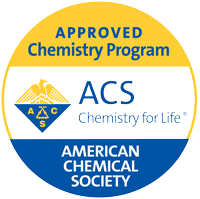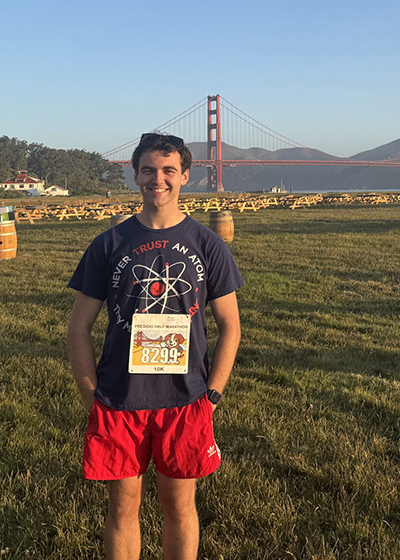Shippensburg University’s Chemistry (BS) curriculum is approved by the American Chemical Society.
You will take courses in all five subdisciplines of chemistry:

- Inorganic
- Organic
- Analytical
- Physical
- Biological
You will also take computer programming and complete approximately 400 hours of laboratory work to learn the technical skills necessary to be a practicing chemist. Core courses provide a foundation in all chemical disciplines as well as physics, math and biology.
What Types of Careers Could I Get With This Degree?
This degree allows you to go directly into the workforce and get a job as a laboratory technician in an analytical or research laboratory. Chemists are also hired as quality control officers for many businesses. All of our graduates that choose to enter the workforce have jobs in the field within six months of graduation.
A chemistry degree also provides access to graduate and professional schools, creating a pathway to careers in university teaching and research, forensics, patent and environmental law, and toxicology, as well as health-related professions like medicine and dentistry.
You can also find a career path in:
• Graduate school in any chemical discipline
• Biotechnology
• Chemical publication editor
• Environmental health
• Forensic chemist
• Health-related professions
• Higher education teaching and research faculty
• Laboratory research technician
• Medical, dental or pharmacy school
• Patent or environmental law
• Pharmaceutical research
• Pharmaceutical sales
• Toxicology
Chemistry major Cole Pearson earns Trish Baisden Award at Nuclear Chemistry Summer School

Wood Honors College student and senior chemistry major Cole Pearson recently earned the Trish Baisden Student of the Year Award, honoring him as a top student among the 12-student cohort at the Nuclear Chemistry Summer School hosted at San Jose State University.
Sponsored by the US Department of Energy and the American Chemical Society, the rigorous six-week program brings together undergraduates from across the country to participate in the study of nuclear chemistry through lectures, labs and field experiences. Students study the chemistry of nuclear materials, radiochemistry, fuel reprocessing and nuclear medicine while visiting top research facilities, including Lawrence Berkeley National Laboratory and Lawrence Livermore National Laboratory.
Pearson described the program as being an “amazing experience,” noting that it pushed him to step out of his comfort zone both academically and on a personal level. “It was very rewarding. By the end of it, my imposter syndrome was beaten into the ground. I realized I can put the work in.”
Course work for Chemistry, BS
The program requires 120 credits including the university's general education curriculum. Some courses meet multiple requirements, but are only counted once toward the 120 credit total required to graduate. This program includes 15 credits of free electives. For full course descriptions, please visit the undergraduate catalog.
Course work for Biochemistry Concentration
The program requires 120 credits including the university's general education curriculum. Some courses meet multiple requirements, but are only counted once toward the 120 credit total required to graduate. This program includes 7-8 credits of free electives.
Course work for Forensics Concentration
The program requires 120 credits including the university's general education curriculum. Some courses meet multiple requirements, but are only counted once toward the 120 credit total required to graduate. This program includes 8 credits of free electives.
Course work for Medical Sciences Concentration
The program requires 120 credits including the university's general education curriculum. Some courses meet multiple requirements, but are only counted once toward the 120 credit total required to graduate. This program includes 11 credits of free electives.
Course work for Pre-Pharmacy Concentration
The program requires 120 credits including the university's general education curriculum. Some courses meet multiple requirements, but are only counted once toward the 120 credit total required to graduate. This program includes 12 credits of free electives.

